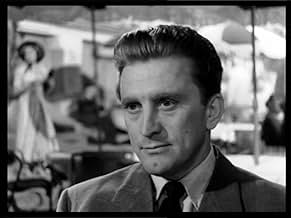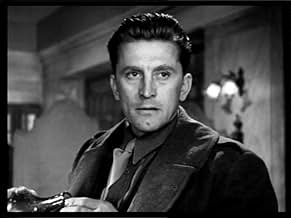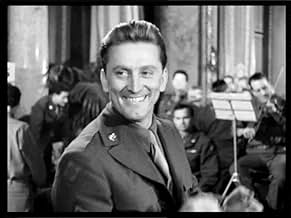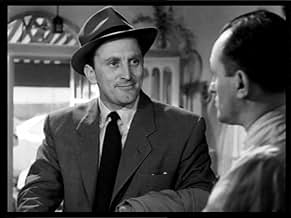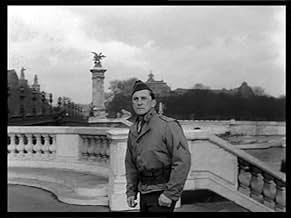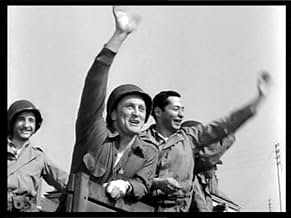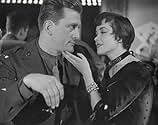Un acte d'amour
- 1953
- Tous publics
- 1h 35m
IMDb RATING
6.5/10
608
YOUR RATING
A former soldier on holiday in the French Riviera recalls his time in France during WWII, and his love for a French peasant woman.A former soldier on holiday in the French Riviera recalls his time in France during WWII, and his love for a French peasant woman.A former soldier on holiday in the French Riviera recalls his time in France during WWII, and his love for a French peasant woman.
- Director
- Writers
- Stars
Martine Alexis
- Une prostituée à la Conciergerie
- (uncredited)
- Director
- Writers
- All cast & crew
- Production, box office & more at IMDbPro
Featured reviews
A low-key film with a fine cast. Unfortunately, it's so low-key as to seem nearly aimless for the first half. The pace and interest do pick up, however, toward the end.
As World war II grinds slowly to a halt in Europe, an innocent French girl on the brink of prostitution and a cynical but lonely GI fall in love in the City of Lights - where, due to the war, the lights don't always work, A flaw, at least as the film plays on television, is that the French accents are sometimes hard to understand. And there are plenty of them.
Though ten years too old for the role, not unusual for actors in war movies before the '70s, Douglas turns in a solid performance as Pfc. Teller, the wounded American soldier now stationed at an army headquarters in Paris. But it is the lovely Dany Robin, rarely seen in America, who deserves most of the acting credit for keeping the rather unfocused story interesting. Fernand Ledoux is adequately brooding and resentful. The eighteen-year-old Brigitte Bardot is already beautiful, but look sharp or you may miss her.
The real scene-stealer here, though, is the slinky Barbara Laage, who shows herself to be a fine actress in very nearly her only American film. Too bad she breezes out of the picture a third of the way through.
The on-location shots of Paris are also a plus in a film that sometimes flirts dangerously with soap opera. Not a classic or even a forgotten classic, but worth your time if bittersweet love is your cup of tea.
As World war II grinds slowly to a halt in Europe, an innocent French girl on the brink of prostitution and a cynical but lonely GI fall in love in the City of Lights - where, due to the war, the lights don't always work, A flaw, at least as the film plays on television, is that the French accents are sometimes hard to understand. And there are plenty of them.
Though ten years too old for the role, not unusual for actors in war movies before the '70s, Douglas turns in a solid performance as Pfc. Teller, the wounded American soldier now stationed at an army headquarters in Paris. But it is the lovely Dany Robin, rarely seen in America, who deserves most of the acting credit for keeping the rather unfocused story interesting. Fernand Ledoux is adequately brooding and resentful. The eighteen-year-old Brigitte Bardot is already beautiful, but look sharp or you may miss her.
The real scene-stealer here, though, is the slinky Barbara Laage, who shows herself to be a fine actress in very nearly her only American film. Too bad she breezes out of the picture a third of the way through.
The on-location shots of Paris are also a plus in a film that sometimes flirts dangerously with soap opera. Not a classic or even a forgotten classic, but worth your time if bittersweet love is your cup of tea.
I just saw "An Act of Love" on cable television and I was amazed at the high production values of this film. Kirk Douglas has never given a bad performance in any film and here he has just the right touch as an actor. The story was mesmerizing and the ending was as sad and moving as any film that I have ever seen. I hope against hope that someday I can purchase this film on video or on DVD.
7B24
How truly odd it is that so little attention to this film is evident in these archives. Apart from some quibbles one might have with its casting, the occasionally stilted dialogue, or some melodramatic nonsense here and there, it really is an important addition to the Kirk Douglas oeuvre as well as a story about a character very much like those he played later in "Paths of Glory" and "Lonely Are the Brave."
Douglas must have had more than a passing hand in choosing roles for himself during his career. Unlike many of his contemporaries (Brando comes to mind), he has played characters that require a fine balance between kinetic displays of a true hero and moments of self-effacing and troubled doubt. It is not so much the quality of the writing at work here as it is his own deliberate and skillful willingness to interpret the role honestly, without regard to any supposed preconceptions of what his audience expects of him.
I write this with a degree of reservation, because I never much cared for his voice or his looks. The fact that I admire his acting skill is perhaps all the more enhanced by this admission, however. With a profile a little less vivid and a better vocal range and timbre, he might have played Shakespeare.
His French colleagues in the present effort are more stereotypical than one cares for. They are made to speak a kind of pidgin English that was generally thought acceptable in 1953 for American audiences. Subtitles accompanying actual French would be requisite for any remake.
Moreover, there is that recurrent tinge of sentimentality and bathos. But I still liked it on the whole, giving it a solid 7 out of 10.
Douglas must have had more than a passing hand in choosing roles for himself during his career. Unlike many of his contemporaries (Brando comes to mind), he has played characters that require a fine balance between kinetic displays of a true hero and moments of self-effacing and troubled doubt. It is not so much the quality of the writing at work here as it is his own deliberate and skillful willingness to interpret the role honestly, without regard to any supposed preconceptions of what his audience expects of him.
I write this with a degree of reservation, because I never much cared for his voice or his looks. The fact that I admire his acting skill is perhaps all the more enhanced by this admission, however. With a profile a little less vivid and a better vocal range and timbre, he might have played Shakespeare.
His French colleagues in the present effort are more stereotypical than one cares for. They are made to speak a kind of pidgin English that was generally thought acceptable in 1953 for American audiences. Subtitles accompanying actual French would be requisite for any remake.
Moreover, there is that recurrent tinge of sentimentality and bathos. But I still liked it on the whole, giving it a solid 7 out of 10.
USA/French co-productions are a rarity. But this serves its subject matter superbly well - that time when American soldiers in their hundreds of thousands were first fighters then feted liberators on French soil. As does the script - nobody is a stereotype, everyone has their own, believable, character. Perhaps the sense of authenticity came also from the short time, just 8 years, between the events portrayed and when it was filmed. This was not one author's or one scriptwriter's imagination - it must have been a vivid memory in the minds of tens if not hundreds of thousands of American soldiers. Equally vivid for the French who had seen occupation or collaboration then liberation. There is a certain graciousness and humanity in the treatment of the characters. Later and lesser writers and directors would portray such situations as simply the meeting of drunken animalistic soldiers with faceless whores and thieving tricky locals. There is a dignity and respect to this film which has all but disappeared in subsequent "war movies".
Star that he is, was Kirk Douglas well-cast? I think not. Kirk Douglas portrayed even personified a particular type: given to action either outer or inner. Here he plays a far less certain character, not driven but drifting. Douglas was always Spartacus, even if the Romans couldn't spot him, viewers could every time. Perhaps this was a role for Mitchum - a mixture of integrity tempered by a degree of indolence.
This is not a film packed with stars, it is packed with people, American and French - a tribute to the director, writers and cast.
(British viewers might recognise a familiar face - Leslie Dwyer (here a quirky cameo Tommy with "just 5 teeth") later the grumpy child-hating children's entertainer in a '80's TV comedy series Hi De Hi!.)
Star that he is, was Kirk Douglas well-cast? I think not. Kirk Douglas portrayed even personified a particular type: given to action either outer or inner. Here he plays a far less certain character, not driven but drifting. Douglas was always Spartacus, even if the Romans couldn't spot him, viewers could every time. Perhaps this was a role for Mitchum - a mixture of integrity tempered by a degree of indolence.
This is not a film packed with stars, it is packed with people, American and French - a tribute to the director, writers and cast.
(British viewers might recognise a familiar face - Leslie Dwyer (here a quirky cameo Tommy with "just 5 teeth") later the grumpy child-hating children's entertainer in a '80's TV comedy series Hi De Hi!.)
Act of Love (1953) is a bittersweet love story about the star-crossed relationship between a World War II GI and a young Parisian during the Allied liberation of Paris. KIRK DOUGLAS plays Robert Teller, an Army PFC who, while stationed in France toward the end of World War II, meets and falls in love with a destitute French woman, Lise Gudayec (DANY ROBIN). When Teller seeks permission to marry Lise, his condescending commanding officer (GEORGE MATHEWS) has Teller transferred because he considers the young woman to be an opportunist. The transfer has tragic consequences.
The film's ending is highly emotional when Teller visits the small French Riviera hotel that Lise told him about. At the hotel he has a bitter encounter with his former commanding officer. And it is in one of the hotel rooms that Teller, while recalling the descriptive words of Lise, fully realizes how truly beautiful was their brief love affair. Get out the hankies for this ending. The film marked the debut of French-born Robin in an English-speaking film. Robin, who began her career as a ballerina with the Paris Opera, made her screen debut in 1946 at the age of 19 in the French film Les Portes de la Nuit (Gates of the Night).
Filmed in Paris and on the French Riviera, Act of Love was one of three films that Douglas made abroad during 1952 and '53. The other two were The Juggler (1953), which was filmed in Israel, and Ulysses (1954), which was filmed in Italy. During the three-picture, near-two-year filming schedule, Douglas spent a total of just one month in the United States.
Act of Love also marked the first appearance in an English-speaking film by BRIGITTE BARDOT, who would subsequently gain fame with her pouting good looks and curvaceous figure as France's "sex kitten." In Act of Love, Bardot portrays Mimi, a friend of Lise.
Act of Love was based on the 1949 novel The Girl on the Via Flaminia by ALFRED HAYES. The film's screenplay was by German writer Joseph KESSEL and American novelist-screenwriter IRWIN SHAW. Shaw's other well-known film credits included Fire Down Below (1957) and The Young Lions (1958). Kessel also wrote the French dialogue for the version released in France, titled Un acte d'amour.
For the record: Robin retired from film-making in 1969, after completing the ALFRED HITCHCOCK spy thriller Topaz. She and her husband, British producer MICHAEL SULLIVAN, died in a fire in 1995. She was 68. Robin was known for her dislike of journalists even during the height of her career. Because of this, journalists in 1953 and '54 presented her with the annual Lemon Prize, which is given to the nastiest French actress.
The film's ending is highly emotional when Teller visits the small French Riviera hotel that Lise told him about. At the hotel he has a bitter encounter with his former commanding officer. And it is in one of the hotel rooms that Teller, while recalling the descriptive words of Lise, fully realizes how truly beautiful was their brief love affair. Get out the hankies for this ending. The film marked the debut of French-born Robin in an English-speaking film. Robin, who began her career as a ballerina with the Paris Opera, made her screen debut in 1946 at the age of 19 in the French film Les Portes de la Nuit (Gates of the Night).
Filmed in Paris and on the French Riviera, Act of Love was one of three films that Douglas made abroad during 1952 and '53. The other two were The Juggler (1953), which was filmed in Israel, and Ulysses (1954), which was filmed in Italy. During the three-picture, near-two-year filming schedule, Douglas spent a total of just one month in the United States.
Act of Love also marked the first appearance in an English-speaking film by BRIGITTE BARDOT, who would subsequently gain fame with her pouting good looks and curvaceous figure as France's "sex kitten." In Act of Love, Bardot portrays Mimi, a friend of Lise.
Act of Love was based on the 1949 novel The Girl on the Via Flaminia by ALFRED HAYES. The film's screenplay was by German writer Joseph KESSEL and American novelist-screenwriter IRWIN SHAW. Shaw's other well-known film credits included Fire Down Below (1957) and The Young Lions (1958). Kessel also wrote the French dialogue for the version released in France, titled Un acte d'amour.
For the record: Robin retired from film-making in 1969, after completing the ALFRED HITCHCOCK spy thriller Topaz. She and her husband, British producer MICHAEL SULLIVAN, died in a fire in 1995. She was 68. Robin was known for her dislike of journalists even during the height of her career. Because of this, journalists in 1953 and '54 presented her with the annual Lemon Prize, which is given to the nastiest French actress.
Did you know
- TriviaKirk Douglas also did the French language version's dialogue.
- Quotes
Robert Teller: The River Seine. All my life I wanted to see it. Finally I saw it, with a gun in my hand. Travel, twentieth-century style.
- ConnectionsFeatured in Veraz (1991)
- How long is Act of Love?Powered by Alexa
Details
- Release date
- Countries of origin
- Languages
- Also known as
- La Fille de la rue Flaminia
- Filming locations
- Production companies
- See more company credits at IMDbPro
- Runtime
- 1h 35m(95 min)
- Color
- Sound mix
- Aspect ratio
- 1.37 : 1
Contribute to this page
Suggest an edit or add missing content

